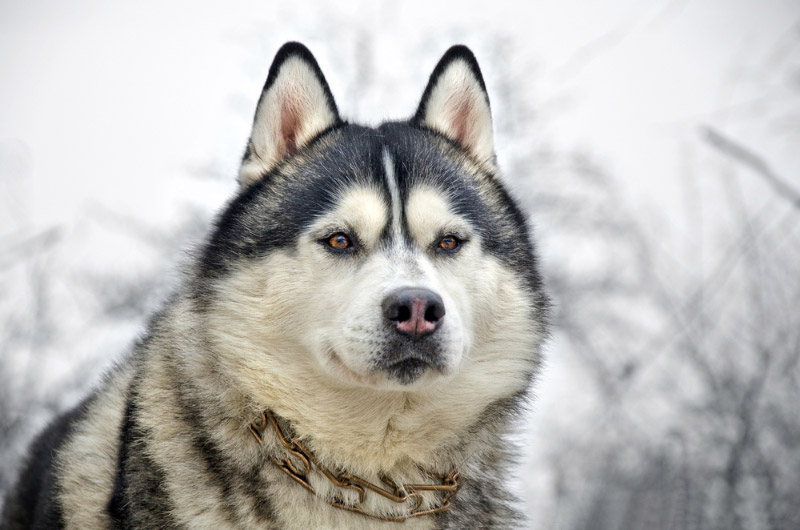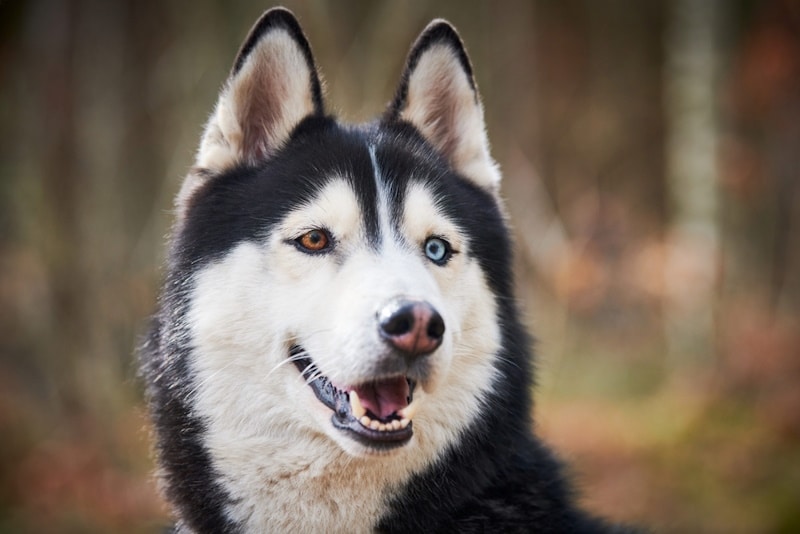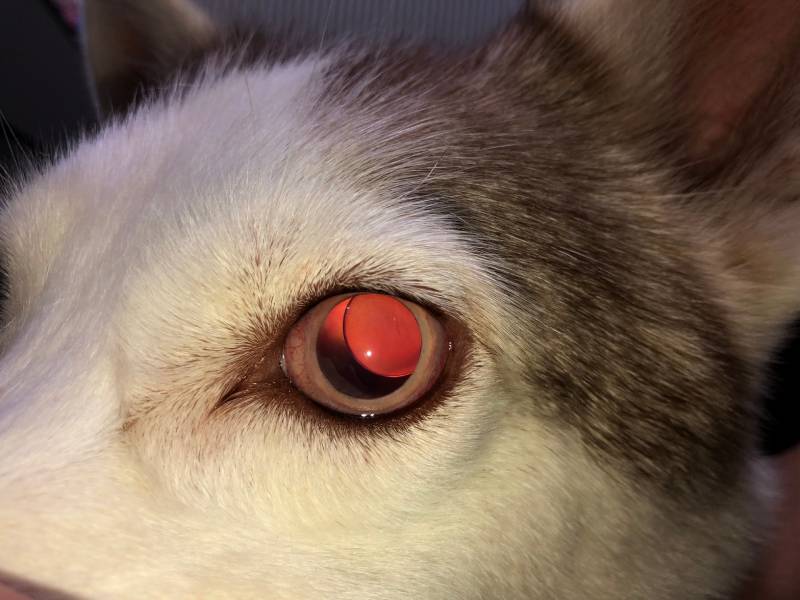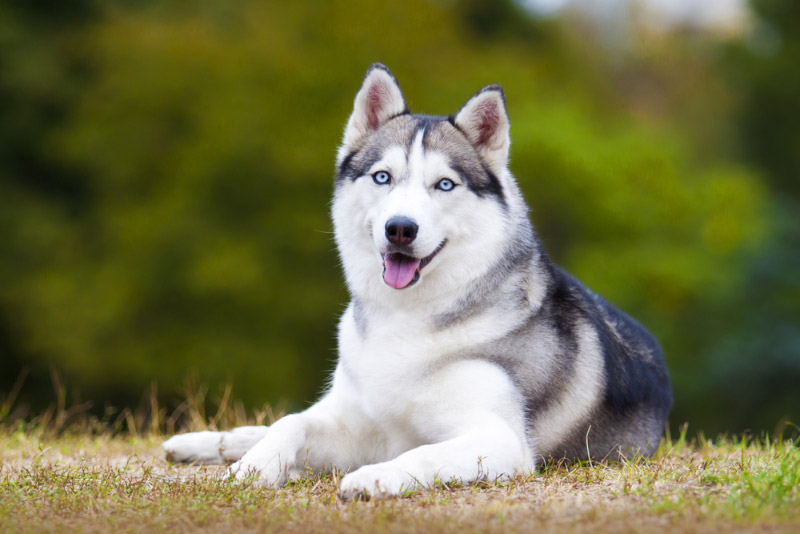Huskies are often known for their striking almond-shaped eyes with varied eye colors. While the most common and distinct color noted in huskies is a bright icy blue, they can also be brown, green, amber, or bi-colored. Huskies (like all puppies) have blue eyes when they are born, and these naturally change to their designated eye color (as decided by genetics) by anywhere from 9–16 weeks.
Husky eyes are always an interesting topic, but can their eyes organically change color outside of puppyhood? This is unlikely, but alterations in eye color can occur in these dogs as they age, although changes in eye color as an adult are usually an indication of an eye problem.
When Does a Husky’s Eye Color Change?
All dogs are born with blue eyes, and their eye color changes during their puppyhood, which is normal. This color change is usually complete when they are around 16 weeks old. By this age, the blue eyes they were born with have gradually changed color to the one dictated by their genetic make-up.
During this time, you may notice a variation in shades and hues as this process sorts itself out. As Huskies grow into adulthood, their eye color should stabilize, and it becomes less likely to change unless something causes it.

Eye Colors in Huskies
A Husky’s eye color is unlikely to change when they are adults. However, their glorious eyes can be any of the following, which is dependent on their genes and DNA.
- Icy blue (most common)
- Amber
- Brown
- Green
- Two different colored eyes (bi-colored), known as heterochromia
What Is Heterochromia?
Heterochromia is a condition characterized by a difference in coloration of the iris (the colored part of the eye) between the two eyes and is not uncommon in Huskies. This can manifest as one eye being blue while the other is brown, or any other combination of eye colors.
Huskies are known for the prevalence of heterochromia, and it is a distinctive and visually striking trait in the breed. Heterochromia can be complete, where each eye is a distinctly different color, or it can be sectoral or partial, where only a portion of one eye has a different color.
The genetic basis for heterochromia in dogs is complex, and it can be influenced by various factors. It is relatively common in Huskies and doesn’t have any negative impact on your dog’s health.

Why Do Huskies Have Bright Blue Eyes?
The bright blue eyes in Huskies are primarily the result of genetics. The gene responsible for blue eye color in Huskies and some other dog breeds is associated with a reduced amount of melanin in the iris—the colored part of the eye. So, it isn’t the case that they contain a special blue pigment color, but rather, it is due to the lack of pigment.
Melanin is a pigment that contributes to the coloration of the eyes, skin, and coat in all animals, including humans. In the case of blue-eyed Huskies, there is a genetic variation that leads to a lower concentration of melanin in the iris. This allows more light to scatter and reflect off the back of the eye, creating the distinctive bright blue appearance.
Reasons for Red-Looking Eyes in Huskies
Do Huskies’ eyes turn red when angry, or is it something else? While a Husky’s eye color (or any dog’s eyes) can turn red, it is usually in response to either an eye problem, an underlying health condition, a behavioral issue (stress or anxiety), or a response to light (often seen in photos). If you notice that your dog’s eyes are red, it is best to get them checked out by a vet.
- Allergies
- Foreign Bodies
- Scratching/skin conditions
- Conjunctivitis, also known as pink eye (inflammation of the conjunctiva)
- Glaucoma (increased pressure in the eye)
- Dry eye
- Prolapse of the eye, also known as cherry eye
Please note that anger itself doesn’t cause their eyes to turn red. Red eyes may transiently occur due to stress or anxiety as opposed to it being a normal response to anger. In cases of stress, the blood vessels become more visible on the white background, creating a red appearance.

Reaction to Light
You may have noticed that your dog’s eyes look red when your dog looks at you and catches the light (from lamps or car headlights, for example) on their eyes at a certain angle or in pictures. In these scenarios, your dog’s eyes shining red or even a green/yellow color is a completely normal response and nothing to be concerned about.
Dogs have a layer of cells in the eye behind the retina called the tapetum lucidum. As light hits your dog’s eyes, the tapetum reflects the light back. This reflection enhances their ability to see in low-light conditions. The tapetum lucidum can contribute to the appearance of a red or greenish glow in a dog’s eyes, especially when exposed to light in low-light environments or when a light source (such as a camera flash) is directed at their eyes.
Except for light reflection, any redness noted in your Husky’s eyes needs investigation and treatment (if required) by your veterinarian.
Conclusion
The color changes you might observe in your Husky’s eyes are typically associated with breed tendencies, genetics, or as a natural response to light. These are all normal and you have no control over them. If, however, you notice unusual changes in your dog’s eyes, behavior, or any part of their general health, it’s a good idea to consult with a veterinarian to rule out any underlying health issues, especially if their eyes are turning red or pink.
Featured Image Credit: Sbolotova, Shutterstock











